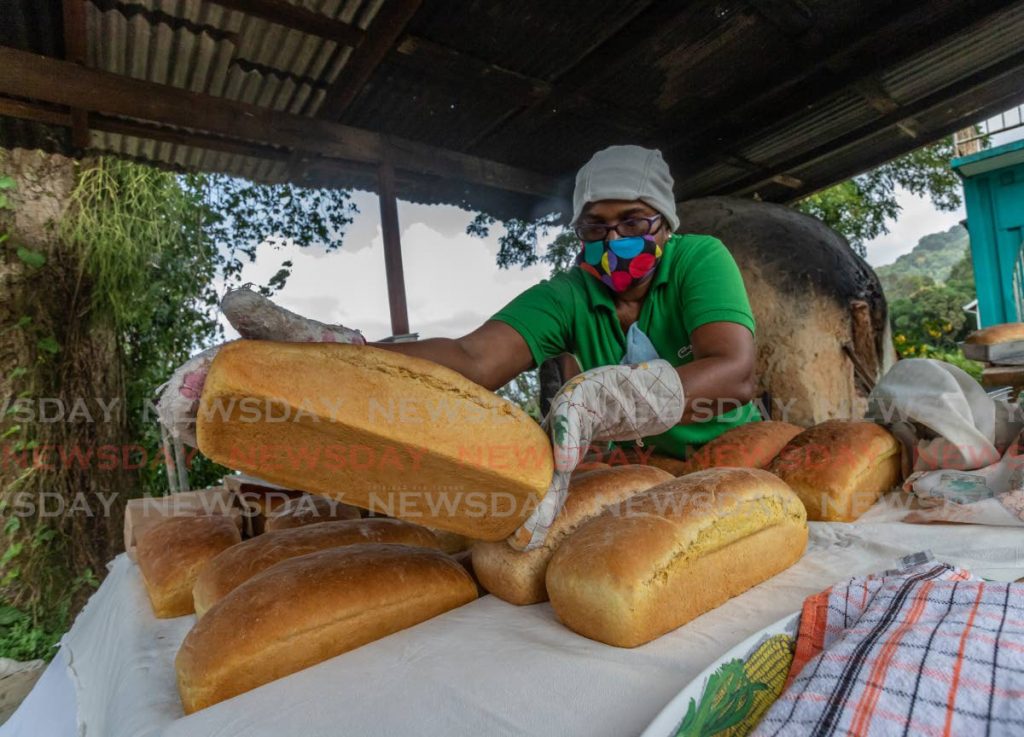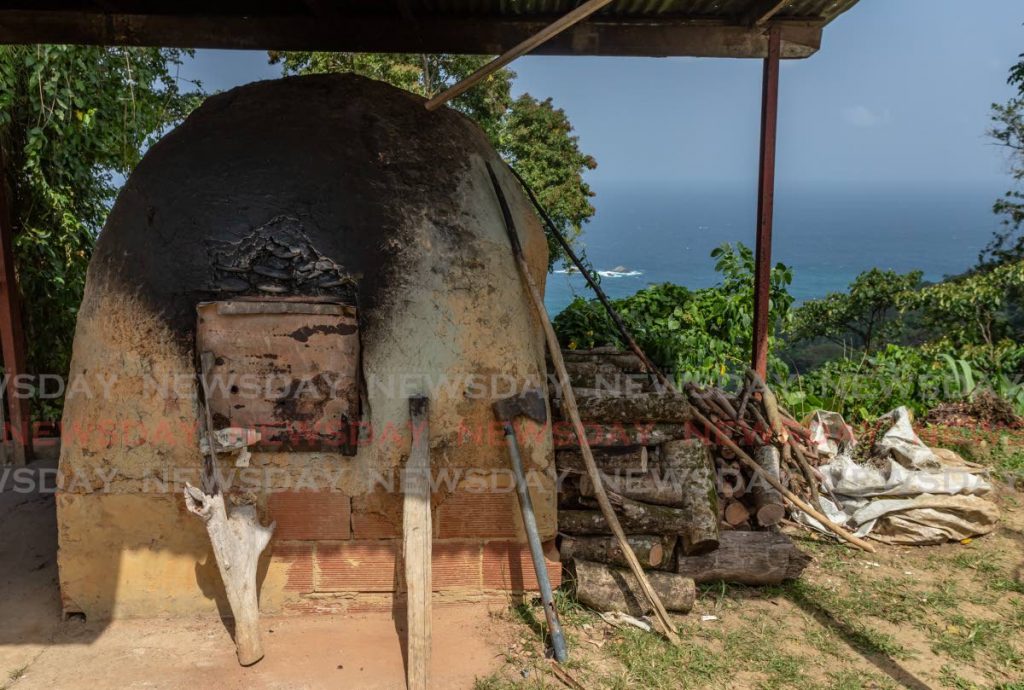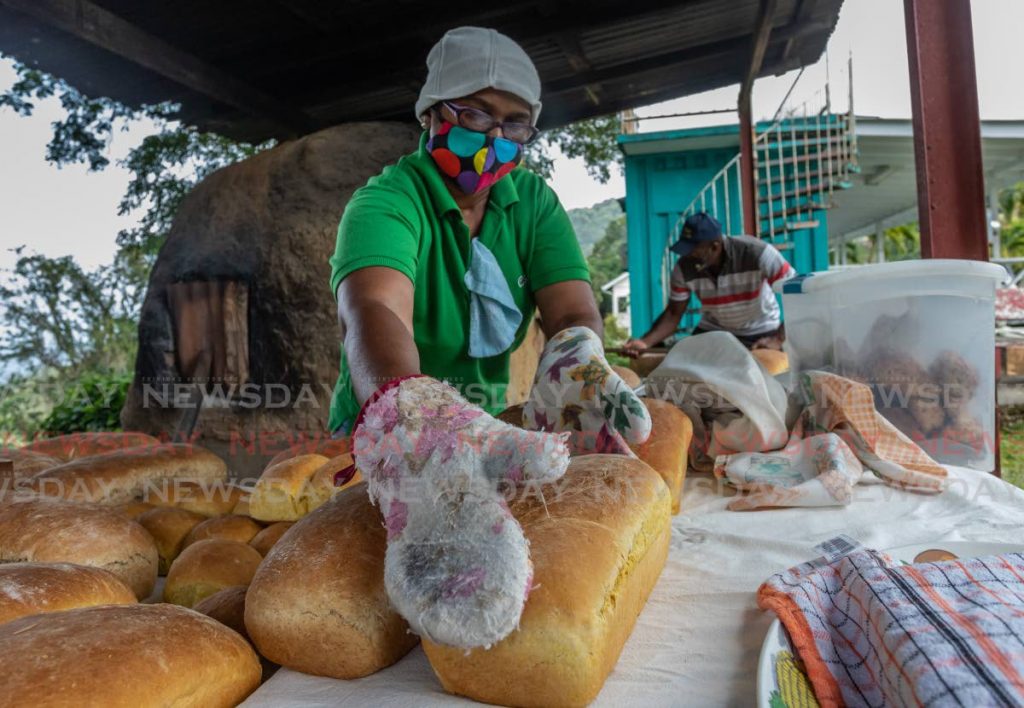L'Anse Fourmi family keeps dirt oven tradition alive

Sundays in Tobago are usually reserved for church or a relaxing day at the beach. But there is another Sunday tradition which might entice food lovers.
Snuggled at the bottom of the hill in L’Anse Fourmi lies a huge dirt oven run by 49-year-old Earl Manswell.
The oven, which was built by members of the community, churns out wholewheat and pumpkin bread, coconut drops, cakes and other baked goods. The bread is made by Manswell and his wife Judy, with assistance from their 14-year-old son Matthew.
In an interview with Newsday on Friday, Manswell said he has been involved in dirt-oven baking since he was a teen, but became more involved over the last ten years.
Manswell said, “We had dirt oven in our yard, had a dirt oven by my grand queen (mother) and great aunt and plenty people had dirt oven in their own yards before they went to the stove. It had some older women used to be baking cake and stuff in the dirt oven by us, so I learnt this from being around. I grew up knowing how the dirt oven operates.”
Manswell said his first job was at a local baking company, where he was responsible for rolling the dough.

He credited community stalwart Dr Verleen Bobb-Lewis for urging him to take the business seriously and keep the tradition alive.
Manswell said the oven was rebuilt by villagers using river stones and mud. It is sheltered from the elements by a galvanised shed.
On Sundays, the area is transformed into a small bakery. A table next to the shed is covered with warm loaves of bread with a unique aroma that often lures passers-by to stop and buy. The texture and taste usually turns first-time customers into loyal ones.
Manswell said the oven is lit at 5am every Sunday.
“That oven would be heated for approximately four hours. I light the oven, put enough wood in it for it to heat so I know by the time it burns down to coals...During this time, I would knead my flour with my hands – no machine.“After I knead the bread, I do the coconut drops,then I roll them out – I doing all the rolling, my wife would help me grease the pans, but I doing all the rolling – put them in the pan, then carry them out and rest them on the table.
"By the time I done that, I would organise and see how high the bread come. I would sweep the oven, then put them in.” noting that Within 45 minutes to an hour, his bread is ready to come out of the oven.
Items baked in the dirt oven taste completely different from those baked in a conventional oven.
Like most businesses, Manswell's was not immune to the covid19 pandemic. But although things are a little slow, his products still sell out.
“When the borders were open and the foreigners come, the maxi taxis would bring them. But now, with the domestic tourism, people are ordering ahead of time just to come and pick up – like a curbside pick-up. I also try to cater for people who may be passing – sometimes people pass and they smell it, and they stop, so I does still try to cater for those as well, who didn’t order.
"But all does sell out.”
He added: “People wait patiently to get a taste, especially the bread with cheese as we offer that as well.”

He also takes orders and has them ready for collection. His main focus is on wholewheat and pumpkin bread in loaves and hops, while cakes, drops, tarts and sweetbread are made to order.
Noting the revival of dirt ovens in recent years, Manswell is willing to pass on his knowledge to those who may be interested in learning.
In 2019 he tutored a four-day workshop with children in the community, teaching them how to build the dirt oven.
“I even showed them how to mix the flour. I gave everybody their bowl, ingredients, show them how to make the mixture and then bake it in the same dirt oven. It was good – it was really good,” he said.
But he believes younger people do not seem as interested in carrying on the tradition.
However, he says he will keep baking for as long as he could.
“My son, who is now 14, was in the class that I taught, and...I know he can make his own little fry bake and other things. All of my brothers could bake as well.
"So I don’t know if my son himself would take it up or if one of my brothers would take up the mantle and do it, but they can do it, We’ll see. Or I don’t know if somebody from the group that I would have trained would rise to the occasion.”
He said he has a friend who always chastises him for not taking baking more seriously.
“He always says, ‘Boy, you not supposed to be doing no construction work, you supposed to be making bread.’ He always told me that my bread is supposed to be on grocery shelves."
He said people should always follow their passion.

“The Master has given each and everyone of us a gift. It's an honest way of making a dollar. So if maybe five other people could start, at the end of the day, they can make an income for themselves and maybe their family. So I would encourage them that once they have a passion and can get into it, is to do it.”
Manswell can be contacted at 715-1249.

Comments
"L’Anse Fourmi family keeps dirt oven tradition alive"